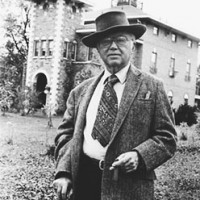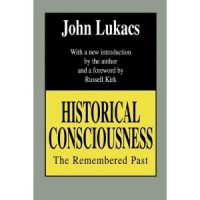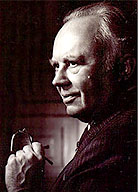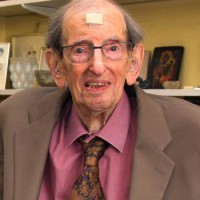Russell Kirk on Cultivating the Good Life, by Bruce Frohnen
When Russell Kirk passed away he was surrounded by his loving family, in the house he built on his ancestral land. This was fitting for a man who always wished to lead a life of “decent independence.” He had sought to provide for his family while remaining free from compromising entanglements. He did not want gratitude to some benefactor to cloud his judgment or tempt him to defend the “Permanent Things” with less than his full vigor.
Egalité dans la barbarie, by Chantal Delsol
La violence est un langage. Quand on l’a appris jeune, on le parle naturellement. Elle est un type de relation aux autres dont on use quand on n’a rien d’autre. Celui qui ne sait pas parler détruit. Celui qui possède peu de mots lance des invectives. D’une manière générale, plus un individu dispose d’un lexique, et moins il a de chances de taper.
Car le langage est une arme aussi, qui peut d’ailleurs s’avérer redoutable et même meurtrière. Mais alors on mesure, dans un pays où la méthode globale d’apprentissage de la lecture a été généralisée par idéologie, et où l’expression langagière rigoureuse a été négligée sciemment pour ne pas contraindre, on mesure de quelle manière la violence accapare le vide ainsi créé.
Beaucoup d’enfants n’ont plus de mots. On les voit qui cherchent leurs expressions, hagards de n’être pas compris, et qui emploient un seul mot connu pour dire tout un champ lexical ; qui s’expriment sans cesse en hurlant, sur un ton de colère et d’irritation, pour compenser la juste phrase qui manque. Tout cela parce que les dictées et les poésies, c’est réactionnaire.
Peuvent empêcher la violence enfantine : l’autorité ou le pouvoir. L’une et l’autre diffèrent grandement. L’autorité ici vient des parents, et des éducateurs en général : elle consiste à fonder la loi chez un sujet en devenir. Ou lui apprendre à se restreindre, à “s’empêcher”, comme disait Camus. Le lui apprendre par la conviction, en le persuadant qu’il est plus humain et plus séduisant de parler à autrui que de le frapper – faut-il encore lui donner les moyens : c’est-à-dire les mots. Mais faute d’autorité, il y a le pouvoir : les parents peuvent frapper l’enfant pour lui faire passer l’envie de frapper – processus dorénavant interdit par les lois. Mais surtout, le pouvoir politique emprisonne les violents, et contient en partie la violence par la crainte de la punition.
Dans une société, l’autorité et le pouvoir sont comme des vases communicants. Plus l’autorité est efficace, autrement dit plus la loi est intégrée à l’individu, et moins il y a besoin de pouvoir. Et inversement. Quand la famille n’éduque plus, il faut que l’Etat punisse largement. Si actuellement nous nous trouvons en face d’une situation propice aux violences enfantines, c’est en raison de cette transition : l’éducation parentale est défaillante, mais le pouvoir d’État n’a pas encore pris le relais. Ce qui ne saurait tarder, car aucune société ne saurait vivre dans la violence.
Bien entendu, cette évolution n’a rien de réjouissant. Mieux vaudrait, et cent fois, que les parents et éducateurs reprennent la main, afin que les gouvernants ne se voient pas contraints de déployer la police dans les lycées (certaines mesures récentes montrent qu’on en est déjà là).
La violence découle ici d’un refus de l’autorité, et le refus de l’autorité est consacré par le culte bien français de l’égalité. L’enfant généralement n’obéit pas volontiers à son enseignant, mais si tout est fait pour délégitimer l’autorité, on ne voit pas pourquoi il se forcerait. Les parents ne sont pas obligés de tenir l’enseignant pour un grand savant, mais s’ils le dénigrent devant l’enfant on peut être sûr que celui-ci se croira pour le coup tout-puissant, conséquences comprises.
Ce ne sont pas seulement les personnes ou les groupes qui sont dénigrés, mais le savoir lui-même, et la culture. Celle-ci contraint et opprime, dit-on. Elle produit des inégalités (ce qui est exact). Les temps ont changé, ou plutôt ont glissé : la culture n’est plus fasciste, elle est “bourge” – et pour satisfaire à l’idée d’égalité, on valorise l’inculte qui au moins n’écrase personne. Alors qu’il serait plus constructif à long terme de valoriser le plus policé et de le donner en exemple aux autres. Mais le seul fait de donner en exemple est perçu comme discriminatoire. On se prive donc du mimétisme de l’excellence. C’est dommage, car il n’y a pas plus mimétique qu’un enfant.
Cette stigmatisation de la culture correspond à la survalorisation de la nature, si prégnante. Soyez vous-même! Suivez vos envies ! Ne vous en laissez pas accroire ! Et donc : apologie de la jungle. Car la nature, c’est la violence, le rat mangé par le lion. C’est pourquoi la génération 68 a viré tranquillement au cynisme – quand on raye les principes moraux parce que bourgeois, ne reste plus que le cynisme.
Combien de dogmes mythiques volent en éclats, comme celui rousseauiste de la bonté naturelle ! On ne sait pas à quel degré de violence il faudra en arriver pour qu’une réflexion s’engage sur la réalité. Peut-être qu’aucune réflexion ne s’engagera, et que le pouvoir prendra le relais de l’autorité parentale, rendant la violence pour la violence, et punissant ceux qui n’ont pas su “s’empêcher” eux-mêmes. On préférerait de beaucoup que soient restaurées dans leur légitimité les autorités d’en bas (même si elles peuvent aussi devenir excessives), que les enfants soient engagés à acquérir des mots au travers de périples culturels (même si certains vont avoir du coup plus de mots que d’autres). Mieux vaut plus de civilisation dans l’inégalité que l’égalité dans la barbarie.
Read the complete article in Valeurs Actuelles
History Resurgent, by Brainard Cheney.
“You couldn’t be more right,” is the warm affirmation of an amiable friend of mine that I would like to apply to this book. Dr. Lukacs here has achieved an informed, discriminating, and balanced assessment of our waggambraus times and a recognition of a potential for our salvation. Too, he has provided responsible and penetrating criticism of the present “Interregnum.” And he has presented or “re-presented” sound ground for his perspective.
Dr. Lukacs examines the passing of the Modern Age, with its disastrous scientific worldview, to find that it leaves behind “monstrous institutions of scientific technology . . . governed by puny men,” and our grim realization that “for the first time the end of the world is in sight.”
To be sure, he is not the first man to sight the end of the world, nor to sound an alarm. His work is rather a diagnosis of causes and a consideration of the terms of avoidance. The Modern Age, our Pandora’s box, produced two “achievements of the modern European mind”: the scientific thought and the historic thought. And it is in recent modification of scientific “Absolutism” by the historical form of thought that hope now resides. To put it more exactly: “This movement from the physics of historical force to the history of physics, marks, in itself, the developing historicity of our consciousness.” Mr. Lukacs finds that “the elements of a potential harmony between historical and scientific thought are already here. It is only because of the extraordinary intellectual confusion of our times that the existence of this harmony has gone either unrecognized or that it has been rather willfully obscured by certain vested interests of the mind.”
Read the complete article in The University Bookman
A summary of the Conservative Mind
Aaron McLeod, a former Wilbur Fellow, has written an excellent Summary of Russell Kirk’s The Conservative Mind, the first number in the Alabama Policy Institute’s “Essential Readings for the Modern Conservative” series. Aaron takes 70 pages to explain the themes and approach of Kirk’s 509-page book, and we commend him for his fine work and recommend this free PDF e-book to all who would like to become acquainted with Kirk’s thought and the conservative intellectual tradition. It will whet your appetite.
Published by The Russell Kirk Center
Eric Hobsbawm, 1917-2012, by Roger Kimball
In the annals of moral idiocy, the Marxist British historian Eric Hobsbawm, who died yesterday at 95, will ever enjoy a conspicuous place. A gifted and prolific writer, the Egyptian-born Hobsbawm was utterly absorbed by the ideology that fired his youthful dreams of utopia. How he must have savored the fact that he was born in 1917, the year of the Bolshevist revolution in Russia which ushered in so much poverty, misery, terror, and freedom-blighting totalitarian oppression. “The dream of the October Revolution is still there somewhere inside me,” Hobsbawm wrote in his memoir Interesting Times in 2002, “I have abandoned, nay, rejected it, but it has not been obliterated. To this day, I notice myself treating the memory and tradition of the USSR with an indulgence and tenderness.”
Indeed. Hobsbawm was adulated by an academic establishment inured to celebrating partisans of totalitarian regimes so long as they are identifiably left-wing totalitarian regimes. Although he claimed to have been victim of a “weaker McCarthyism” that retard advancement of leftists in the UK, Hobsbawm enjoyed a stellar career replete with official honors, preferments, and perquisites. He was showered with honors and academic appointments at home and abroad. His books won all manner of awards. In 1998 he was appointed to the Order of the Companions of Honor. But the central fact about Hobsbawm, as about so many doctrinaire leftists, was his willingness to barter real people for imaginary social progress. If he “abandoned, nay rejected” the “dream” of the October Revolution, he never abandoned its animating core: an almost reflexive willingness to sacrifice innocent lives for the sake of a spurious ideal.
The philosopher David Stove once identified “bloodthirstyness” as the motivating force of Communism and its offshoots. Scratch a socialist and you discover a fondness for the gulag. This describes Hobsbawm to a T. In 1994, the venerable historian discussed the former Soviet Union with a television interviewer. What Hobsbawm’s position comes down to, the interviewer suggested, “is saying that had the radiant tomorrow actually been created, the loss of fifteen, twenty million people might have been justified?” Hobsbawm: “Yes.”



